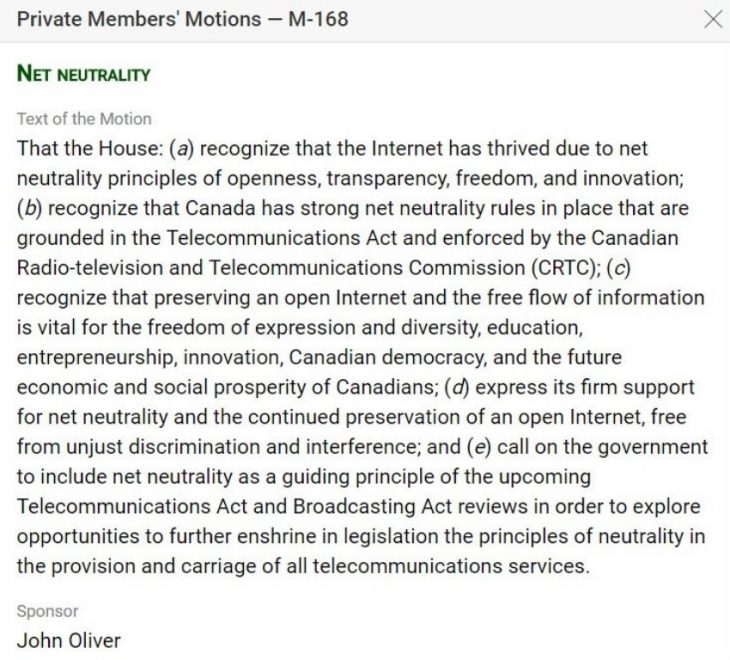
DID YOU HEAR THE good news? Last week the whole of Parliament agreed that net neutrality is a great thing and our Telecom and Broadcasting Acts, if rewritten, must reflect that. Sound the trumpets. The bickering is over. All is now well.
This news, where a few reported net neutrality was now forever protected by law in Canada, was greeted by some as either great news, or something horrible (it seems most Canadians didn’t even notice, however). The Financial Post’s Terrence Corcoran went a bit over the top in his denunciation and then former commissioner Tim Denton quickly smacked him right down. Others stood and applauded – well as much as one can on social media from behind a phone or keyboard.
The net neutrality news was about a motion passed last week which we’ve screen capped at right. Proposed by Oakville, Ont. Liberal MP John Oliver (no, not that net neutrality defender John Oliver) it was supported by all political corners, 277-0. Ah, Sunny Ways, right?
Give me a break.
We have read reams of policy and legislation and we know (and so do all the MPs who supported this waste of time) the one thing all of these meaningful, often massive documents place first and foremost – before all the clauses and shalls and herebys – is a list of definitions which delineate a specific understanding of what every important term you see the rest of the way in the law or policy actually means.
For example, in the Broadcasting Act, its first definition, unsurprisingly, is for the word broadcasting, and it states: “broadcasting means any transmission of programs, whether or not encrypted, by radio waves or other means of telecommunication for reception by the public by means of broadcasting receiving apparatus, but does not include any such transmission of programs that is made solely for performance or display in a public place.”
(Ed note: Damn, that’s pretty tech neutral and might already encompass what’s going on now via the open internet, but we digress…)
The Telecommunications Act of course offers up a definition of telecommunications which says: “telecommunications means the emission, transmission or reception of intelligence by any wire, cable, radio, optical or other electromagnetic system, or by any similar technical system.”
(Ed note: Jeepers. Reading that along side the definition of broadcasting and we’re thinking whomever wrote these words back in 1991 and 1993, respectively, really future proofed the Acts and it makes one wonder how much rewriting they need, if any. Shoot, digressing again.)
So with no definition of network neutrality offered, there isn’t a single thing in Oliver’s motion that can not be supported by everyone. It’s akin to a resolution saying we like puppies. Who doesn’t like puppies? Who doesn’t want a free and open internet? This entire text can be supported from everyone from Open Media and PIAC to the FairPlay Coalition and Bell Canada.
The motion simply doesn’t define network neutrality and as those who study the issue will surely tell you, that is what is of utmost importance. Net neutrality means so many different things to so many different people and so the devil, as always is in the details – in those definitions, then within the Acts’ clauses themselves.
(Ed note: Wait a minute, speaking of details, section 36 in the Telecom Act also says: “Except where the Commission approves otherwise, a Canadian carrier shall not control the content or influence the meaning or purpose of telecommunications carried by it for the public.” Wow. Isn’t that pretty close to a net neutrality definition right there? Has it been in the legislation the whole time? Darn. Digressing again)
So, if this meaningless motion passed last week had attempted to define what net neutrality is, or if MP Oliver had, oh, digested some details to better inform this flimsy motion, then that surely would have been a watershed moment.
But with no definition, which is everything, we have nothing.


